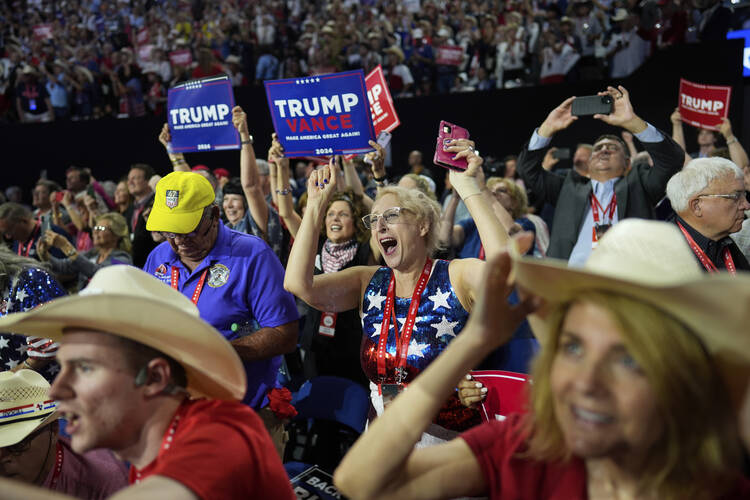At Lucas Oil Stadium in Indianapolis last night, Mother Olga of the Sacred Heart spoke to a captivated audience of 40,000 at the National Eucharistic Congress about the healing power of the real presence of Jesus in the Eucharist.
Standing beneath blue banners and placards that signaled the (merely symbolic) presence of Peyton Manning, Reggie Wayne and a few A.F.C. South division championships, the founder of the Daughters of Mary of Nazareth, in the Archdiocese of Boston, told a story about placing a pyx with the Blessed Sacrament in the incubator of a one-pound preemie named Baby Emma.
According to Mother Olga, the real presence of Jesus strengthened Emma for the 191 days she was in that incubator. Emma eventually was released and recently celebrated her first birthday. A picture of Baby Emma smashing cake into her mouth went up on the huge screens flanking Mother Olga. She declared, “She is now 18 pounds!” Everyone cheered.
Presentations like Mother Olga’s—along with T-shirts that proclaimed “Body Blood Soul Divinity,” a “Eucharistic Miracles” exhibit, lectures on the theology of the Eucharist and silent adoration before a massive and shining gold monstrance—all drove home the main catechetical point of the entire Eucharistic Congress: That when we behold the white wafer, we are actually seeing the body of Christ. The wine we drink is actually the blood of Christ.
The whole thing reminds me of that quote by Flannery O’Connor: “For the almost-blind you draw large and startling figures.” For those tepid about this fundamental Catholic belief, you roll in vast and lengthy eucharistic pilgrimages, you fill chapels with clouds of incense, you pull out large and startling monstrances.
At the same time, the congregants were challenged to not end their encounter with Christ with an intellectual knowledge of the “real presence.” In a talk after Mother Olga’s, Father Michael Schmitz (employing to great effect the occasional “Bro, really!”) interrogated the “real presence” script. He asked, “Is the point of the Mass the presence of Jesus? No. It is his presence that makes his sacrifice possible.”
He quoted Jeremiah who denounced the Israelites who smugly said “We have the Lord, we have the Lord!” but were still living corrupt lives.
“We can have the real presence, but our hearts are far from him,” Father Schmitz said.
In the history of Christianity, he said, no revival has ever taken place without some focus on repentance. “You have to reform your ways.”
“I have Jesus! But if I’m not willing to repent, it makes no difference whatsoever. If I don’t give him my heart, he is that much less glorified.”
Ultimately, the catechism was not enough. Knowledge of the real presence was not enough. “Knowledge can make someone great, but only love can make a saint,” Father Schmitz said.
Later that evening, I was shown a picture of a different congregation, with its own unique catechesis. It was the audience at the Republican National Convention the night J.D. Vance, a Catholic convert, was nominated for vice president. The attendees were waving their own large and startling figures: “Deport Them All.” Send undocumented migrants out of the country.
And it occurred to me that there were probably at least a few undocumented Catholic migrants at the Eucharistic Congress. Kneeling before a huge gold monstrance. Receiving the consecrated host. Getting in touch with the Eucharist as the real presence of Jesus. Being exhorted to reform their lives. And a couple states away, being told they were going to be deported.
Maybe in a few months all of these Catholics, the undocumented body of Christ, will in fact be summarily rounded up and deported. Maybe they will be plucked from their jobs, their homes, torn away from their children and sent back to where they came from. I don’t know. Maybe that is true. I hope it is not.
But if that is the case, God will still be at work. Perhaps they will become, in their own way, eucharistic missionaries. Not sunk in despair but attaching their suffering to that of Christ on the cross.
Or maybe the reformed hearts at the Congress will leave Indianapolis with a new attitude when faced with signs like “Deport Them All.” Filled with the real presence of Christ the Refugee, maybe we will say, “Uh, no. Deport them all? Actually, no.”
America was at the 10th annual National Eucharistic Congress in Indianapolis. Find additional essays and reflections here.








